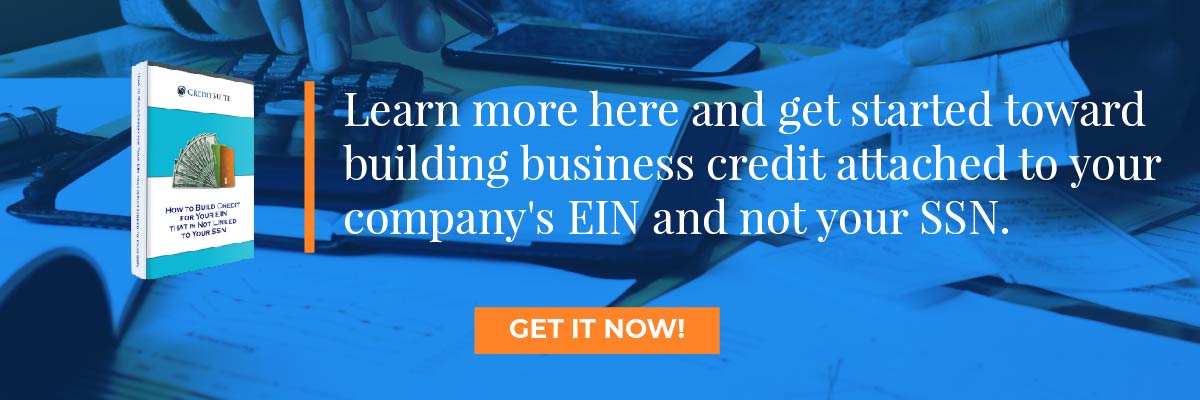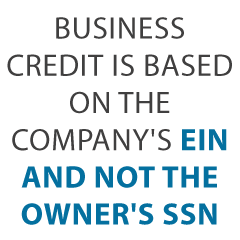- Connect With Us!
- (877) 600-2487
- info@creditsuite.com
How to Start Building Business Credit – Shh, these are Financing Secrets
Published By Janet Gershen-Siegel at September 30th, 2017
Here’s How to Start Building Business Credit the Professional Way
When you start building business credit, doors open. So here’s how to start building business credit.
Establishing business credit means that your company acquires chances you never believed you would. You can get new equipment, bid on real property, and cover the company payroll. And you can do so even when times are a bit lean. This is especially helpful in seasonal businesses, where you can go for months with only minimal sales.
Because of this, you should work on building your business credit. Improve and maintain your scores and you will have these chances. Do not, and either you do not get these opportunities, or they will cost you a lot more. And no business owner wants that. You need to know what affects your business credit before you can make it better.
How to Start Building Business Credit: The Method
Business credit is credit in a business’s name. It doesn’t tie to a business owner’s individual credit, not even when the owner is a sole proprietor and the sole employee of the business.
As such, an entrepreneur’s business and individual credit scores can be very different.
How to Start Building Business Credit: The Advantages
Because business credit is separate from consumer, it helps to protect a small business owner’s personal assets, in the event of legal action or business insolvency.
Also, with two distinct credit scores, a business owner can get two separate cards from the same vendor. This effectively doubles purchasing power.
Another advantage is that even startup companies can do this. Heading to a bank for a business loan can be a recipe for frustration. But building company credit, when done properly, is a plan for success.
Personal credit scores rely on payments but also other components like credit utilization percentages.
But for small business credit, the scores actually merely depend on whether a small business pays its debts promptly.
How to Start Building Business Credit: The Process
Building business credit is a process, and it does not happen without effort. A small business will need to actively work to build small business credit.
Nonetheless, it can be done readily and quickly, and it is much swifter than establishing individual credit scores.
Vendors are a big part of this process.
Accomplishing the steps out of sequence will result in repetitive rejections. No one can start at the top with business credit. For example, you can’t start with store or cash credit from your bank. If you do, you’ll get a rejection 100% of the time.
How to Start Building Business Credit: Business Fundability
A company must be fundable to credit issuers and merchants.
For that reason, a business will need a professional-looking web site and email address. And it needs to have site hosting bought from a supplier such as GoDaddy.
In addition, business telephone and fax numbers should have a listing on ListYourself.net.
Also, the business telephone number should be toll-free (800 exchange or similar).
A business will also need a bank account dedicated strictly to it, and it has to have all of the licenses necessary for operating.
Licenses
These licenses all must be in the specific, correct name of the small business. And they must have the same business address and telephone numbers.
So bear in mind, that this means not just state licenses, but potentially also city licenses.
Learn more here and get started with how to start building business credit.
How to Start Building Business Credit: Dealing with the Internal Revenue Service
Visit the IRS website and get an EIN for the business. They’re totally free. Pick a business entity like corporation, LLC, etc.
A business can start off as a sole proprietor. But they will probably wish to switch to a type of corporation or partnership.
This is in order to diminish risk. And it will optimize tax benefits.
A business entity will matter when it concerns taxes and liability in case of litigation. A sole proprietorship means the business owner is it when it comes to liability and tax obligations. Nobody else is responsible.
Sole Proprietors Take Note
If you run a business as a sole proprietor, then at least be sure to file for a DBA. This is ‘doing business as’ status.
If you do not, then your personal name is the same as the business name. Because of this, you can end up being personally responsible for all business debts.
Additionally, per the Internal Revenue Service, by having this arrangement there is a 1 in 7 chance of an IRS audit. There is a 1 in 50 possibility for corporations! Avoid confusion and dramatically lower the odds of an Internal Revenue Service audit at the same time.
Beginning the Business Credit Reporting Process
Begin at the D&B web site and get a cost-free D-U-N-S number. A D-U-N-S number is how D&B gets a company into their system, to generate a PAYDEX score. If there is no D-U-N-S number, then there is no record and no PAYDEX score.
Once in D&B’s system, search Equifax and Experian’s web sites for the company. You can do this at fastcs.wpengine.com/reports. If there is a record with them, check it for correctness and completeness. If there are no records with them, go to the next step in the process.
In this manner, Experian and Equifax will have something to report on.
Vendor Credit Tier
First you ought to establish trade lines that report. This is also referred to as the vendor credit tier. Then you’ll have an established credit profile, and you’ll get a business credit score.
And with an established business credit profile and score you can start acquiring retail store and cash credit.
These kinds of accounts tend to be for the things bought all the time, like coffee, shipping boxes, outdoor work wear, ink and toner, and office furniture.
But to start with, what is trade credit? These trade lines are credit issuers who will give you initial credit when you have none now. Terms are generally Net 30, rather than revolving.
Hence, if you get an approval for $1,000 in vendor credit and use all of it, you must pay that money back in a set term, like within 30 days on a Net 30 account.
Learn more here and get started with how to start building business credit.
Details
Net 30 accounts have to be paid in full within 30 days. 60 accounts have to be paid completely within 60 days. In contrast to with revolving accounts, you have a set time when you have to pay back what you borrowed or the credit you made use of.
To begin your business credit profile properly, you need to get approval for vendor accounts that report to the business credit reporting agencies. When that’s done, you can then use the credit.
Then repay what you used, and the account is on report to Dun & Bradstreet, Experian, or Equifax.
Vendor Credit Tier – It Helps
Not every vendor can help like true starter credit can. These are vendors that will grant an approval with minimal effort. You also want them to be reporting to one or more of the big three CRAs: Dun & Bradstreet, Equifax, and Experian.
You want 5 to 8 of these to move onto the next step, which is the retail credit tier. But you may need to apply more than one time to these vendors. So, this is to confirm you are dependable and will pay in a timely manner.
Uline Shipping Supplies
Uline Shipping Supplies is a true starter vendor. You can find them online at www.uline.com. They offer shipping, packing, and industrial supplies, and they report to D&B.
You must have a D-U-N-S number. They will request 2 references and a bank reference. The initial few orders may need to be paid in advance to first get approval for Net 30 terms.
Quill
Quill is another true starter vendor. You can find them online at www.quill.com. They sell office, packaging, and cleaning supplies, and they report to D&B and Experian.
Because Quill reports to two separate credit reporting agencies, you get two credit experiences with them. Place an initial order first unless the D&B score is established.
Typically they will put you on a 90-day prepayment schedule. If you order items monthly for 3 months, they will in most cases approve you for a Net 30 Account.
Grainger Industrial Supply
Grainger Industrial Supply is likewise a true starter vendor. You can find them online at www.grainger.com. They sell safety equipment, plumbing supplies, and more, and they report to D&B. You will need to have a business license, EIN, and a D-U-N-S number.
For less than a $1000 credit limit they will approve nearly anyone with a business license.
Accounts That Don’t Report
Non-Reporting Trade Accounts can also be helpful. While you do want trade accounts to report to at least one of the CRAs, a trade account which does not report can nonetheless be of some value.
You can always ask non-reporting accounts for trade references. Also credit accounts of any sort should help you to better even out business expenses, consequently making budgeting simpler. These are providers like PayPal Credit, T-Mobile, and Best Buy.
Retail Credit Tier
Once there are 5 to 8 or more vendor trade accounts reporting to at least one of the CRAs, then move to the retail credit tier. These are businesses which include Office Depot and Staples.
Use the business’s EIN on these credit applications.
One good example is Lowe’s. They report to D&B, Equifax and Business Experian. They want to see a D-U-N-S and a PAYDEX score of 78 or more.
Fleet Credit Tier
Are there 8 to 10 accounts reporting? Then move onto the fleet credit tier. These are service providers like BP and Conoco. Use this credit to purchase fuel, and to fix and maintain vehicles. Make certain to apply using the company’s EIN.
One such example is Shell. They report to D&B and Business Experian. They want to see a PAYDEX Score of 78 or more and a 411 company telephone listing.
Shell may claim they want a particular amount of time in business or profits. But if you already have adequate vendor accounts, that won’t be necessary. And you can still get approval.
Learn more here and get started with how to start building business credit.
Cash Credit Tier
Have you been sensibly managing the credit you’ve gotten up to this point? Then move to the cash credit tier. These are service providers such as Visa and MasterCard. Keep your SSN off these applications; use your EIN instead.
One example is the Fuelman MasterCard. They report to D&B and Equifax Business. They want to see a PAYDEX Score of 78 or more. And they also want you to have 10 trade lines reporting on your D&B report.
Plus, they want to see a $10,000 high credit limit reporting on your D&B report (other account reporting).
In addition, they want you to have an established small business.
These are businesses such as Walmart and Dell, and also Home Depot, BP, and Racetrac. These are frequently MasterCard credit cards. If you have 14 trade accounts reporting, then these are feasible.
Monitor Your Business Credit
Know what is happening with your credit. Make certain it is being reported and attend to any errors ASAP. Get in the practice of taking a look at credit reports and digging into the details, and not just the scores.
We can help you monitor business credit at Experian and D&B for only $24/month. See: fastcs.wpengine.com/business-credit-monitoring.
At D&B you can monitor at: www.dandb.com/credit-builder. At Experian, you can monitor your account at: www.smartbusinessreports.com/Landing/1217/. And at Equifax, you can monitor your account at: www.equifax.com/business/business-credit-monitor-small-business. Experian and Equifax cost about $19.99; D&B ranges from $49.99 to $99.99.
Update Your Records
Update the details if there are mistakes or the details is incomplete. At D&B, you can do this at: https://iupdate.dnb.com/iUpdate/viewiUpdateHome.htm. For Experian, go here: www.experian.com/small-business/business-credit-information.jsp. And for Equifax, go here: www.equifax.com/business/small-business.
Fix Your Business Credit
So, what’s all this monitoring for? It’s to contest any inaccuracies in your records. Mistakes in your credit report(s) can be corrected. But the CRAs generally want you to dispute in a particular way.
Get your business’s PAYDEX report at: www.dnb.com/about-us/our-data.html. Get your company’s Experian report at: www.businesscreditfacts.com/pdp.aspx?pg=SearchForm. And get your Equifax business credit report at: www.equifax.com/business/credit-information.
Disputes
Disputing credit report mistakes typically means you send a paper letter with copies of any proof of payment with it. These are documents like receipts and cancelled checks. Never send the original copies. Always send copies and retain the originals.
Fixing credit report errors also means you specifically spell out any charges you challenge. Make your dispute letter as understandable as possible. Be specific about the concerns with your report. Use certified mail so that you will have proof that you sent in your dispute.
Dispute your or your company’s Equifax report by following the instructions here: www.equifax.com/small-business-faqs/#Dispute-FAQs.
You can dispute inaccuracies on your or your business’s Experian report by following the instructions here: www.experian.com/small-business/business-credit-information.jsp.
And D&B’s PAYDEX Customer Service phone number is here: www.dandb.com/glossary/paydex .
A Word about Business Credit Building
Always use credit sensibly! Don’t borrow more than what you can pay back. Keep an eye on balances and deadlines for repayments. Paying off on time and in full will do more to increase business credit scores than almost anything else.
Growing company credit pays. Good business credit scores help a small business get loans. Your loan provider knows the company can pay its debts. They know the business is for real.
The small business’s EIN attaches to high scores and lenders won’t feel the need to demand a personal guarantee.
Business credit is an asset which can help your company for years to come.
How to Start Building Business Credit: Takeaways
Once you know what affects your business credit score, you are that much closer to building improved business credit.

 " class="attachment-blog-single size-blog-single wp-post-image" alt="Get Business Credit Cards for New Businesses Credit Suite-Business Line of Credit Decoded" title="Get Business Credit Cards for New Businesses">>
" class="attachment-blog-single size-blog-single wp-post-image" alt="Get Business Credit Cards for New Businesses Credit Suite-Business Line of Credit Decoded" title="Get Business Credit Cards for New Businesses">>
